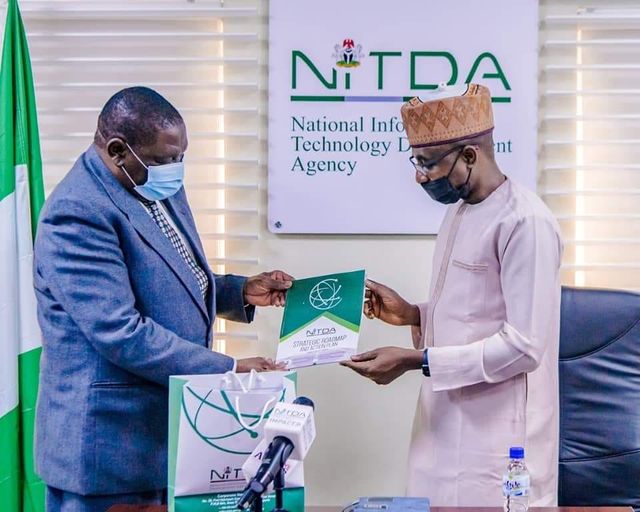The National Information Technology Development Agency (NITDA) and the National Judicial Institute (NJI) are to work on training and upskilling judiciary officers in order to improve the efficiency of the justice system.
The deployment of IT in the judicial system could help improve efficiency of court processes as well as curb any form of corruption, said the Director General of NITDA, Mallam Kashifu Inuwa Abdullahi.
Abdullahi, who was speaking recently in Abuja when he received the Administrator of the National Judicial Institute (NJI), Hon Justice Salisu Garba and his team, harped on the need to train and retrain judiciary officers to acquire IT skills.
RELATED NCC Tasks Judiciary On Implementation Of Emerging Technologies
He said IT training has become critical in the judiciary in order to derive the maximum value from digital technology for judicial officers to best perform their tasks.
The NITDA’s boss encouraged the NJI to leverage emerging technologies, adding that application of Artificial Intelligence (AI) is now making evaluations and decisions for humans based on available data, which has made it important for the judiciary system to adopt the use of IT in their work processes.
His words: “We live in a world where technology can be used to profile and make recommendations. It is therefore very important to incorporate the use of IT into our judiciary system for enhanced work performance.”
He further added that the appropriate deployment of IT in the judicial system will enable courts deal better with the rising caseloads, help in speedily clearing backlogs of cases and also help accomplish the research and planning tasks necessary for the proper administration of justice.
Judges need to have an in-depth understanding of digital literacy skills, a responsibility which he stated falls on the NJI, said Abdullahi.
He further disclosed that in line with the actualization of the National Digital Economy Policy and Strategy (NDEPS), the full introduction and implementation of Digital Transformation by the Agency for all Ministries, Departments and Agencies (MDAs) have been in top gear.
“We have set up Digital Transformation Technical Working Groups in several MDAs while a few more will be inaugurated soon. Your Institute can be taken on board in this laudable initiative and inaugurated as well if you are ready”, said Abdullahi.
While laying emphasis on the importance of protecting data, he implored the NJI to include the Nigerian Data Protection Regulations (NDPR) in their curriculum and promised a robust capacity building support in that regard.
He said: “Most of the sources we get our information from now is online and these big techs use artificial intelligence to know our preferences by gathering data. It is therefore important to ensure protection of our data by all means necessary.”
While speaking earlier, Hon Justice Garba disclosed that the objective of the NJI is to conduct trainings for all judicial officers and auxiliary staff.
He said the Institute’s Judiciary Information Technology Policy Committee, saddled with the responsibility of formulating policies, has been faced with challenges but is optimistic that IT will bridge the gap.
“The essence of this meeting is to collaborate with NITDA in developing our IT skills in order to build our workforce’s digital skills as well as develop virtual court proceedings and conferences in order to reduce our backlogs”, Hon Justice Garba said.

































